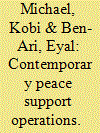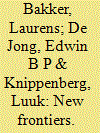|
|
|
Sort Order |
|
|
|
Items / Page
|
|
|
|
|
|
|
| Srl | Item |
| 1 |
ID:
107666


|
|
|
|
|
| Publication |
2011.
|
| Summary/Abstract |
In this article the authors examine two set of issues that constrain contemporary peace support operations (PSOs): one centered on the kinds of knowledge prevalent in PSOs and the second involving the organizational structures that characterize them. The authors' aim is to show the deep discursive and structural limitations and contradictions that continue to characterize the actions of armed forces and the dominance of militaristic thinking within PSOs. This article centers on multidimensional peacekeeping marked by emphasizing two main points in regard to the complex nature of such peacekeeping. First, Western military thinking is still dominant in the professional discourse of peacekeeping despite the fact that in many cases it is less relevant to the arenas where it is applied (in weakened or failed states). Second, forces in second-generation peacekeeping missions are by definition a form of hybrid organizations, and therefore conceptual changes in regard to PSOs not only involve the realm of knowledge but also entail practical consequences for the very organizational means used to achieve their aims. The authors' analysis demonstrates the blending, hybridization, and linkages that are an essential part of PSOs as processes that carry both advantages and disadvantages for organizational action.
|
|
|
|
|
|
|
|
|
|
|
|
|
|
|
|
| 2 |
ID:
153418


|
|
|
|
|
| Summary/Abstract |
Changes in the nature, scale, and speed of natural resource extraction, especially in the last two decades, have resulted in many new resource extraction areas emerging across the world. By zooming in on Indonesia, this article shows that the underlying causes and consequences of current trends are more complex than portrayed by the rancher-squatter model of frontiers that is still frequently used to explain these developments. We argue that a broadened frontier notion is necessary to address the multifaceted nature of the processes underway in contemporary Indonesian extraction areas, as well as beyond. We propose a perspective that pays explicit attention to four new developments that can be described by using the hybridization of space, time, actors, and rules, and are characterized by the fact that these processes create new perimeters in all four mentioned areas. In so doing, we challenge, broaden, and renew the meaning of frontiers.
|
|
|
|
|
|
|
|
|
|
|
|
|
|
|
|
| 3 |
ID:
180049


|
|
|
|
|
| Summary/Abstract |
The peace and conflict literature has paid much attention to the hybridity produced by international peacebuilders and local actors. Although the modalities of hybridity have been discussed, few studies related to hybridity have observed the presence of locally led hybrid peacebuilding. To fill this gap in the literature, this paper addresses an emerging form of hybridization that is distinct from the internationally led type by examining the case of Sri Lanka. The paper takes a new direction by investigating the peace practices of local agents, referred to as grama niladharis (GNs), which has caused changes in the behavior of international actors in liberal peacebuilding in Sri Lanka. An anthropological method is applied with in-depth interviews and participatory observation. The paper identifies a critical direction for the discourse by documenting a form of locally led hybridization in which the GN system, with ownership by the local government, incorporates certain liberal peacebuilding concepts. Through this hybridization, local systems appear to reinterpret the liberal peace practices introduced by international peacebuilders in a modified form of peacebuilding and maintain autonomous local operations.
|
|
|
|
|
|
|
|
|
|
|
|
|
|
|
|
|
|
|
|
|